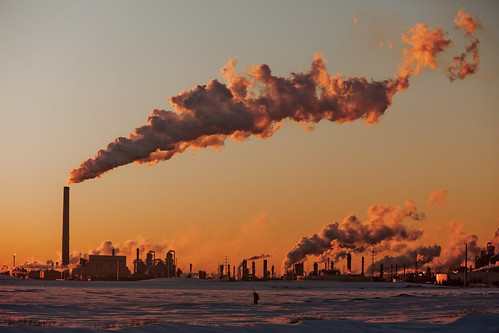How Does Pollution Affect Wildlife?
Published by Nanni on Wednesday, October 10, 2012
Photo credit by kk+
Pollution is hazardous to the health of human beings and the domestic animals that live with us. But is pollution also harmful to the animals that live in the wild with no protection from the elements? How does pollution affect wildlife?
Water Pollution
There are many different types of pollutants that cause water pollution which affects birds, fish and other marine animals.
One of the main water pollutants is organic matter such as sewage, dead vegetation, runoff from fields and erosion from shorelines. This organic matter ends up in rivers, streams and other bodies of water and causes excessive growth of algae and other aquatic plant life. This results in the oxygen in the water to be used at a much faster rate. When the oxygen levels fall below five parts per million, fish and other aquatic organisms have great difficulty breathing and many do not survive.
Other pollutants include pesticides used by farmers and homeowners that run off into streams and rivers. Fish that swim in these waters absorb these pesticides and are poisoned by them. This causes the fish to have shortened life spans and great difficulty in reproducing.
Another water pollutant is oil caused by petroleum spills. The Exxon Valdez oil spill of 1989 is a prime example. This initially caused the death of 250,000 sea birds, 2800 sea otters, 300 harbor seals, 250 bald eagles and numerous salmon eggs and plankton. It is now approximately twenty years later, and oil from this petroleum spill is still killing the area’s marine life.
Plastics and other man made materials are also water pollutants. Fish, birds and other marine life can become entangled in these materials, become injured and die. Large pieces of plastic material may be swallowed by otters, seals, large fish and birds. Even tiny marine organisms may consume plastic that has been broken down into small pieces. The digestive systems of these marine animals are damaged and death often occurs.
Air Pollution
Air pollution is primarily caused by the burning of fossil fuels used for industry, power stations, residential homes and motor vehicles.
Pollutants in the air include sulphur dioxide, oxides of nitrogen, ammonia, ground level ozone, chlorofluorocarbons, carbon monoxide, lead and particulate matter (small particles of carbon residue).
Wildlife is exposed to air pollution by inhalation, by absorption through their skin and by ingesting particulate matter in their food supply. Invertebrates and animals with thin, damp skin are most affected by absorption. Smaller, younger and weaker animals are more susceptible to air pollutants. Pregnant animals and their unborn offspring are also at greater risk.
Pollutants mainly affect the respiration system of animals, causing difficulty in breathing, inflammation of the lungs and cardiopulmonary problems. Air pollutants may cause various types of cancer in wildlife, including lung cancer and skin cancer. Carbon monoxide hampers the blood’s capacity to carry oxygen. Lead causes damage to the kidneys and hearts of animals. Continued exposure to lead and other metals in particulate matter may cause bioaccumulation, the accumulation of toxic substances in animal tissues.
 | Posted in »
| Posted in »

0 comments: Responses to “ How Does Pollution Affect Wildlife? ”